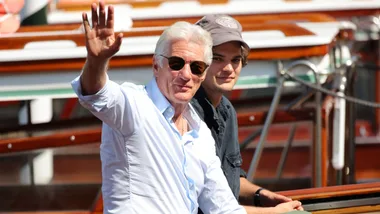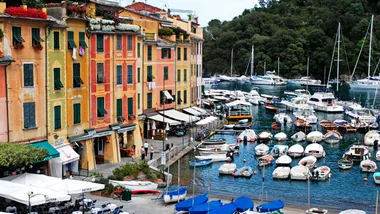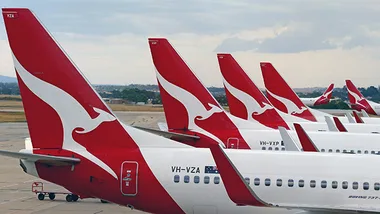From the tarmac, it looks no bigger than a jumbo, but, believe me, it is. As high as a seven-storey building and as long as two blue whales, it can carry 853 passengers in full economy mode, compared to a jumbo’s maximum of 500. Singapore Airlines, however, has decided on 471 seats in three classes: 399 in economy, 60 in business and 12 “beyond first” suites.
As soon as you step on board, you’ll be struck by the spacious main staircase and the subtle mood lighting at the front of the main deck. A party of four could comfortably stroll arm-in-arm to the upper deck on these plush carpeted stairs. At the top, unlike in a jumbo’s bubble, you’ll find there’s an economy cabin on the upper deck, after you’ve walked through the business class cabin.
Now, let’s be honest, it’s never easy to stroll nonchalantly past business-class passengers, sipping champagne on seats the size of sofas, without feeling a twinge of envy, especially at the start of a 23-hour flight.
Business Class
Singapore Airlines’ sensational new business class is likely to turn the average passenger green.
What greets the eye are not rows of seats, but 60 spacious suites, each almost wide enough to park a Smart Car. At 87cm wide, this is the roomiest business class seat in the sky and, because the cabin has been designed with a 1-2-1 configuration, every passenger has aisle access. Naturally, each seat adapts into a flat bed, with linen from Givenchy.
Then there’s the 39cm LCD screen and enough space to allow two passengers, sitting side by side, to enjoy a film or a meal together in the same seat, thanks to two headphone sockets and two fold-away tables.
Those looking for a real bargain – two travelling on one business-class ticket – had better think again. On boarding, every passenger has to have their own seat. You can only get cosy after take-off.
Economy Class
The economy cabin (at the rear of the upper deck) is equally impressive, as there are a few welcome surprises. The seat configuration, 3-4-3, is the same as on a 747, but after row 81 on the upper deck it becomes 2-2-2. Take note, row 81 – the emergency aisle seating – is where every economy passenger will want to sit.
Thanks to a slimmer seat design in economy, there is more leg and knee room – not enough to stretch out in style, but sufficient to make a comfortable difference. The seats are also articulated, which means when the top half angles back, the bottom part on which you sit comes forward, allowing the body to rest in a more natural position.
The adjustable headrest now extends up (especially useful for tall passengers) and has a pair of soft leather wings that move forward, giving considerable more neck and head support.
Moving into the entertainment department, there’s a raft of improvements, especially for film buffs and computer game-addicted children, thanks to a new version of Krisworld that offers more than 1000 on-demand screen and sound options, surely enough to keep any insomniac amused on a long-haul journey. The new economy class video screen is now the size of the average 747’s business class screen and pivots on a wider angle that allows passengers to rid the screen of unwanted reflections. It also comes with better earphones and an unobtrusive reading light at the bottom of the screen, just at the right height to read a book on your fold-away table or lap, without disturbing your neighbour.
Another improvement is a USB plug for bring-your-own memory sticks. This coupled with a little “qwerty” keyboard (on the back-of-seat phone unit) allows passengers to work on their video screen, by accessing airline software. It’s essential to save any work you do on board to a memory stick, as any records are automatically deleted from the A380’s system on touch down.
Continuing the tour to the back of the A380’s upper deck, you’ll find another staircase that leads down to the main deck and a second economy cabin, which has a higher ceiling and is slightly wider than the upper deck.
Beyond First Suites
At the pointy end of the plane, just before the grand staircase you climbed on boarding, are the “beyond first” suites. Those who have travelled in a first class railway carriage may get a sense of déjá vu on entering one of these suites.
Large enough to accommodate four people (two sitting opposite the other two), each suite has a full-length, fold-out bed, a chaise lounge for “companion socialising” and a 58-centimetre flat-screen TV, all behind sliding privacy doors. The price tag is around $10,000 for a one-way journey between Sydney and Singapore, and according to an airline executive, is pitched at the “same sort of market that buys S-Class Mercedes”.
Two suites can also be converted into a super suite, with a double bed. It costs about twice the price, but conveniently comes with a “do not disturb” sign that can be switched on once the sliding doors are closed.
The verdict?
That’s the end of the tour and I think you’ll agree the A380’s wow factor arises from its new first and business class features. The improvements in economy may seem modest in comparison, but they certainly outshine the current facilities on any 747 and will make long-haul journeys a little easier to bear.
A380 facts
There is enough room on its wings to park 72 cars.
The wingspan is 15 metres wider than a 747, but it’s only two metres longer.
Maximum flight range is 13,140km – 1800km greater than the 747, but still not enough to go non-stop from Australia to Europe.
Seats on the maiden flights between Sydney and Singapore were auctioned for charity and raised $1.44million – Singapore Airlines donated $255,000 each to the Children’s Hospital at Westmead and Sydney Children’s Hospital, Randwick.
A Briton paid $123,000 for seat 1A on the maiden flight.
Getting there
Singapore fling
Singapore has come a long way in five years. Once known as an international shopping hub with little else on offer, the city has undergone a mini-renaissance since the opening of its world-class arts centre and opera house. Today, the city is a hub of cutting edge art galleries, futuristic museums, boutique hotels and world-class restaurants. A stroll through Chinatown, Little India or along Clarke Quay on banks of the Singapore River will reveal what a hip and happening place the city has become. Here, we recommend three places to stay and two of the hottest restaurants in Singapore:
High-end: Goodwood Park Hotel
22 Scotts Road (+65 6737 7411; www.goodwoodparkhotel.com)
One of Singapore’s most famous historic hotels, Goodwood Park was founded in 1900 as the Teutonia Club and sits in six hectares of parkland, minutes from the city – an oasis with hidden gardens, two swimming pools and an imposing heritage-listed white tower (pictured). A favourite haunt of the former Sultan of Brunei and Jackie Chan, it has 233 spacious rooms and three restaurants: the Gordon Grill; Min Jiang, famous for its sechuzan cuisine; and Min Jiang at One-north, housed in a black and white colonial bungalow in a leafy enclave 15 minutes from the hotel, and famous for its Peking Duck cooked in the smoke from apple tree wood.
Hip: The Scarlet
33 Erskine Road (+65 6511 3333; www.thescarlethotel.com)
Two minutes walk from Chinatown, the Temple of Heavenly Bliss and the Dravidian-style Hindu Temple, this hotel is housed in a converted terrace of 14 Chinese shop houses, circa 1868, filled with sumptuous baroque décor in many shades of red, black and gold. It’s very theatrical, but impressive. It has 84 lavish rooms with soft leather and velvet furnishings, seductive drapes, resplendent chandeliers, flat-screen TVs, wireless and beautiful bathrooms. The hotel’s Desire restaurant serves breakfast and good international fare for lunch and dinner; the Bold bar is the place to pose and preen; and the roof terrace café/bar offers great cocktails, seafood platters, barbecued meats under the stars.
Budget: Hotel 1929
50 Keong Saik Road (+65 6347 1929; www.hotel1929.com)
In the heart of Chinatown’s former red light district, two minutes walk from MRT underground station, Hotel 1929 offers funky retro-chic in a four-storey, light-filled heritage terrace, circa 1929, with vintage chairs in lobby (Eames, Jacobsen et al). Budget prices attract aspiring artists and architects, older backpackers and anyone in search of style at budget prices, good value considering the 32 compact rooms each have bold Marimekko fabrics, broadband, flat-screen TV, CD player and mosiac-tiled bathrooms. Don’t miss out on the French-Asian fusion food at Embers restaurant, with its floor-to-ceiling plate-glass view over busy street.
Jade restaurant
Fullerton Hotel, 1 Fullerton Square (+65 6733 8388; www.fullertonhotel.com)
One of Singapore’s best restaurants, Jade serves exquisite modern Chinese cuisine in an elegant space on Marina Bay. Chefs Sam Leong and Thomas Chai have both won multiple awards for their contemporary take on Cantonese, Peking and Sechuzan dishes, often fused with Western influences. A million miles from the fare of your local take-away, dishes such as Crispy Wasabi Prawns with Sicked Peking Duck and Grape Salsa and Pan-seared Wagyu Beef with Foie Gras in Port Wine Sauce are highly recommended. The restaurant also has a superb wine list with many Australian vintages. Jade is an experience not to be missed by any aficionados of fine Chinese cuisine.
Humble House restaurant
2-27/29 Espalande Mall (+65 6423 1881; www.tunglok.com)
With its Alice in Wonderland décor, created by Chinese artist-musician Zhang Jin Jie with giant chairs, flowing drapes, water features, simple zen surfaces and atmospheric lighting, Humble House caused a sensation when it opened several years ago. Its food has been called Chinese tapas. Go in a group and order plenty of dishes to get the full range of flavours.
Newsletter conversion description. Get the latest in your inbox.












.png?resize=380%2C285)
.jpg?resize=380%2C285)




.png?resize=380%2C285)










































